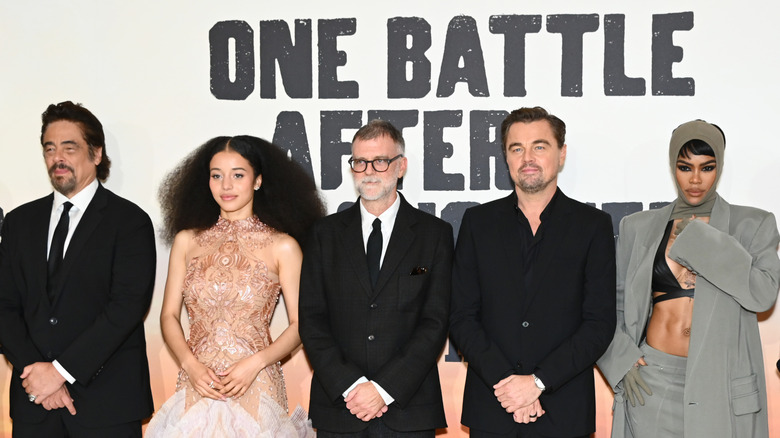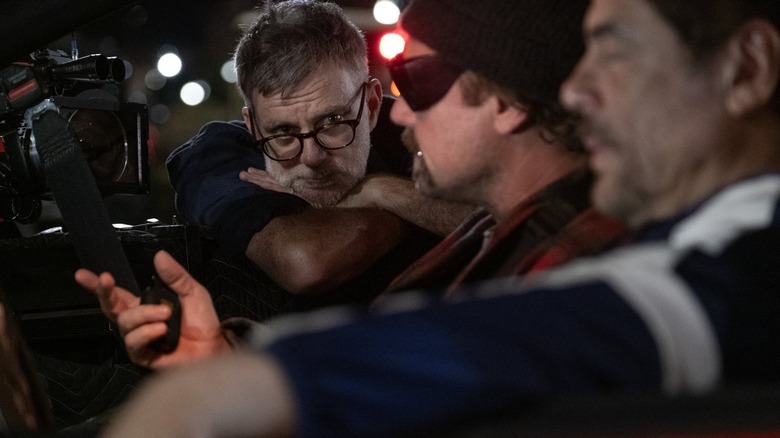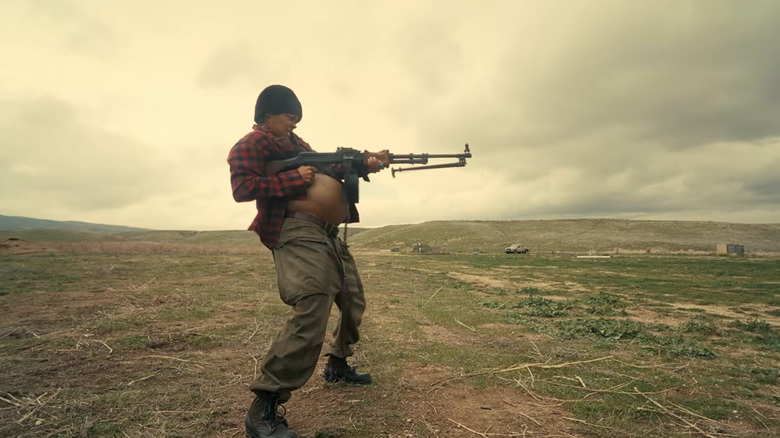PTA Fans Demand An Oscar For One Battle After Another, But Are They Right?
When "One Battle After Another" hit the big screen, it announced itself as the most audacious, expensive, and visually sprawling film of Paul Thomas Anderson's acclaimed career, garnering raucous applause from critics and fans alike. The auteur's first crack at an action-packed blockbuster, PTA's adaptation of Thomas Pynchon's 1990 novel "Vineland" is a paranoia-soaked political epic that projects the legacies of 20th-century revolutionary groups like the Weather Underground and Black Panthers onto a modern political scene, delivering a sharp critique of America's anti-immigration policies clothed in a high-octane conspiracy thriller. The movie lambastes America's police state alongside crowd-pleasing car chases, bank robberies, shootouts, and a shockingly engorged Sean Penn. Striking this balance between social commentary and visual splendor makes "One Battle After Another" an accessible yarn with intellectual depth, speaking to a news cycle littered with ICE raids and national guard deployments despite reportedly being 20 years in the making.
This amalgam of political timeliness, visual spectacle, and ubiquitous praise has OBAA headlining almost every Oscar projection list. Add likely nominations for its superstar cast and breakout star Chase Infiniti, and it's obvious why some believe PTA will win his first Academy Award in March, 2026. But longstanding fans know to take such predictions with a hefty grain of salt. Nominated eleven times across nine films, his role helming classics like "Boogie Nights," "The Master," "There Will Be Blood," and "Phantom Thread" has gone unrewarded by the Academy. But as his most mass-appealing film to date, "One Battle After Another" might be the most readily awardable of Anderson's illustrious career. Many are predicting OBAA will dominate this year's awards, similar to "Anora", 2024's Best Picture winner, a feat that would see the defining cinematic voice of his generation leave the Dolby Theater with a little gold man in hand.
How an American giant goes winless at the Oscars
Predicting Oscar winners is a soft science highly susceptible to months of political jockeying. Recent changes to the voting pool further complicate the calculus. And while the new mandate that Oscar voters watch the films they vote on garners all the headlines, the organization's steady expansion of membership, growing by 40% over the past decade to become more geographically, racially, and gender diverse, makes it more difficult to draw historic parallels between races.
A major piece of PTA's 0-11 record is poor timing, in which his most likely winners were pitted against a murderer's row of industry juggernauts. "Boogie Nights," for instance, lost Best Original Screenplay to Ben Affleck and Matt Damon's lauded breakout, "Good Will Hunting." "There Will Be Blood," perhaps his most deserving piece, lost to another phenomenon, "No Country For Old Men." "Phantom Thread," part of 2017's star-studded Best Picture cohort, lost what many considered an "It's his time" award to industry darling Guillermo del Toro's "The Shape of Water." His other nominated films, "Licorice Pizza" and "Inherent Vice," suffered similar fates. In typical PTA fashion, the auteur received no nominations for a film that many consider a masterpiece, "The Master."
Despite their artistic merits, Anderson's movies don't resemble those typically awarded by the Academy, lacking the sentimentality, blockbuster spectacle, or feel-good politics typical of Best Picture winners. Instead, Anderson's movies, fashioned from an amalgam of deep introspection, brooding pessimism, wry satire, and psycho-emotional chaos, have only won three Oscars out of 28 total nominations: Robert Elswit for Best Cinematography and Daniel Day-Lewis for Best Actor in "There Will Be Blood," and Mark Bridges for Costume Design in "Phantom Thread."
Is it time?
Anderson will compete against some of the industry's most successful directors for next year's top prize, with features coming from Oscar darlings Chloe Zhao, Guillermo del Toro, and Kathryn Bigelow; fellow superstar-snubs Yorgos Lanthimos, Bradley Cooper, Noah Baumbach, Josh and Benny Safdie, Richard Linklater, and Ryan Coogler; and foreign-born creators like Park Chan-wook, Joachim Trier, and Jafar Panahi. Which of these big names comes out on top is difficult to predict, as many major contenders, like Zhao's "Hamnet," Trier's "Sentimental Value," and Josh Safdie's "Marty Supreme," have yet to hit widespread release. The next installment of big-budget franchise films in the "Wicked" and "Avatar" series could also muddle the field, while this year's box office darling "Sinners" was produced by the same studio as Anderson's new film.
As his movie with the most mass appeal, "One Battle After Another" may be the most likely winner of Anderson's career. With a $130 million budget, a 10-minute car chase, and a plethora of side-splitting punch lines, the film is Anderson's most conventional project yet, despite the heft and complexity of its themes. In many ways, it's a testament to Anderson's directorial powers, serving as a stylistic and thematic culmination of his previous features. Anderson's films are famously eclectic, with the theme, structure, and tone varying wildly while retaining his signature aesthetic flair. OBAA, however, ties together fans' favorite elements of his previous features. It combines the sex appeal, humor, freneticism, cultish personalities, and apocalyptic spectacle seen separately across his oeuvre into one high-flying, conventionally structured, explicitly political story. On balance, OBAA speaks to both the current moment and Anderson's career as a whole, making it perhaps the most fitting Best Picture winner of his illustrious career.


